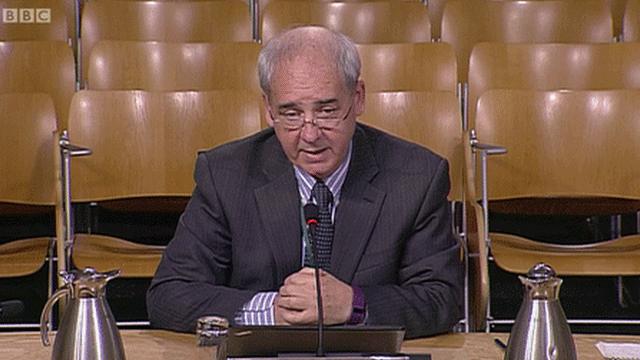Economist David Bell says caution needed over Scottish tax rises
- Published

Prof David Bell appeared before Holyrood's finance committee
An economist has told MSPs that a future Scottish government should "proceed cautiously" over putting up income tax.
Professor David Bell issued his warning while giving evidence to members of Holyrood's finance committee.
From next April, the parliament will be able to set a Scottish rate of income tax and in 2017 it will have control over both rates and bands.
That means it could have a new top rate of income tax above the current 45p.
MSPs heard that those who earned the most would be the most likely to react if taxes were increased.
Prof Bell, of the University of Stirling, told the committee: "Changes in taxpayer behaviour are difficult to predict.
"One finding on which there is agreement is that increases in taxes lead to reductions in taxable income."
He explained that this could lead to a number of reactions from taxpayers, including:
reducing their hours
dropping out of the labour market
retiring
or emigrating.
Prof Bell said such responses would result in lower receipts on other taxes - including VAT and National Insurance - as well as income tax.
He added that tax changes may prompt some in the workforce to reduce their efforts in the workplace or negotiate higher wages to offset their higher taxes.
Prof Bell continued: "Finally, they may seek to avoid tax by reclassifying their income as, for example, profits and this would lead to a transfer of tax receipts from Scotland to the rest of the UK."
Who pays 45p income tax?
332,000
Approximate total for the UK
17,000
Approximate total for Scotland
The SNP and Labour have both pledged to re-introduce the 50% top rate of tax for people earning more than £150,000.
Prof Bell explained: "The group most likely to change their behaviours are the very highly-paid. Scotland gets about 20% of its total income tax revenue from the top 1% of earners.
"That means it faces considerable revenue risk if this group alters their behaviour.
"To me, this suggests that the Scottish government has to proceed cautiously when considering significant changes to the structure of income tax in Scotland."